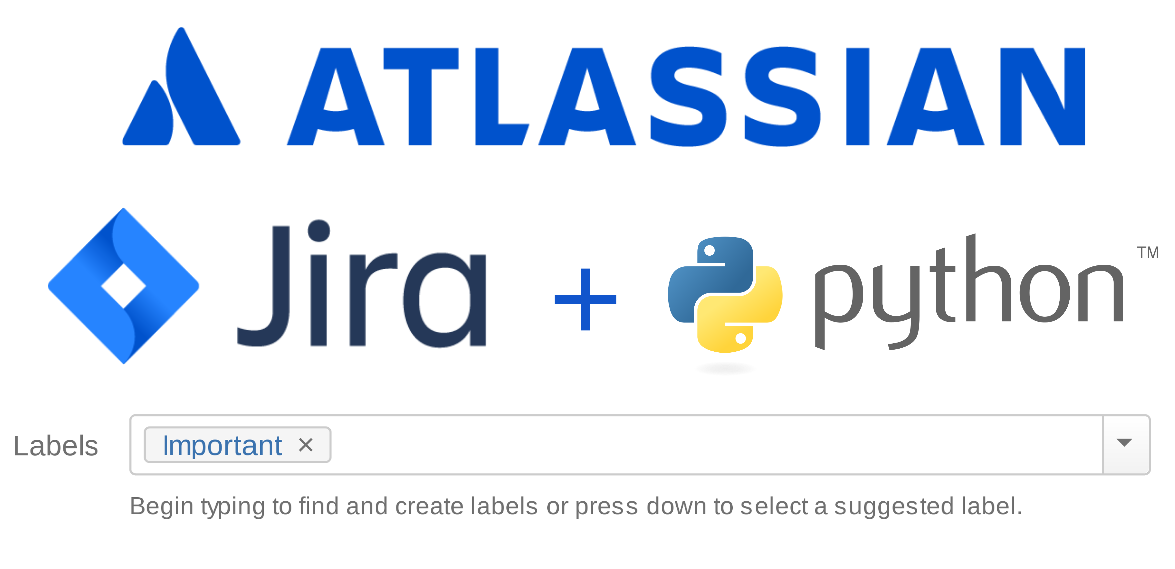Atlassian Jira, Python and automated labeling. I have already wrote about Atlassian Jira automation in “Automated task processing with JIRA API“. But all examples there were with using of curl. So, I decided to make one more post about Jira API. This time with python examples and about labeling issues (nice wordplay, right? 😉 ).

You can use labeles for organizing issues on Jira Scrum and Kanban Boards, Jira Dashboards or just for advanced searching (e.g. labels = "LabelName")
Let’s start from the basics.
How to search Jira issues from your own python scripts?
It’s easy. Send a post request to /rest/api/2/search/ with some JQL expression. Jira server will return first 50 matching issues. If you need more, set a startAt parameter and repeat post requests while the number of issues you requested is less than total number of founded issues (parameter in response).
Something like this:
import requests
import json
requested = 0
search_results = dict()
total = 1
while requested < total:
post_data = json.dumps({'jql': 'assignee in (user_id) order by created DESC', "startAt": requested, "maxResults": 50})
headers = {
'Content-Type': 'application/json',
}
response = requests.post('https://jira.corporation.com/rest/api/2/search/', headers=headers, data=post_data,
verify=False, auth=(user, password))
data = json.loads(response.text)
total = data['total']
search_results[requested] = data
requested += 50
Get the issue IDs from the search_results structure:
for base in search_results:
for key in search_results[base]['issues']:
print(key['key'])
Output:
SECURITY-317
SECURITY-314
SECURITY-313
SECURITY-498
SECURITY-497
SECURITY-402
SECURITY-401
SECURITY-400
SECURITY-489
SECURITY-482
How to get issue date knowing it’s id?
You can do it by sending a get request to /rest/api/2/issue/[issue id]:
issue_id = "SECURITY-498"
headers = {
'Content-Type': 'application/json',
}
response = requests.get('https://jira.corporation.com/rest/api/2/issue/' + str(issue_id), headers=headers,
verify=False, auth=(user, password))
data = json.loads(response.text)
Here are the labels:
print(data['fields']['labels'])
Output:
[u'ImportantLabel']
How to edit the labels of Jira issue?
Create a small json with a part of issue data that you want to change and make a post request to /rest/api/2/issue/[issue id]
headers = {
'Content-Type': 'application/json',
}
new_labels = [ 'ImportantLabel', 'TestLabel' ]
put_data = json.dumps({ 'fields': { 'labels' : list(new_labels) } })
response = requests.put('https://jira.corporation.com/rest/api/2/issue/' + str(issue_id), headers=headers, data=put_data,
verify=False, auth=(user, password))
You can set other Jira fields in a similar way.

Hi! My name is Alexander and I am a Vulnerability Management specialist. You can read more about me here. Currently, the best way to follow me is my Telegram channel @avleonovcom. I update it more often than this site. If you haven’t used Telegram yet, give it a try. It’s great. You can discuss my posts or ask questions at @avleonovchat.
А всех русскоязычных я приглашаю в ещё один телеграмм канал @avleonovrus, первым делом теперь пишу туда.

Pingback: Confluence REST API for reading and updating wiki pages | Alexander V. Leonov
I tried exactly the last method to update labels, but I got server response 400.
I tried updated component field and it works well, here is my code for component field update
put_data = ‘{“update” : {“components” : [{“add” : {“name” : “%s”}}]}}’ % component
any help on this?